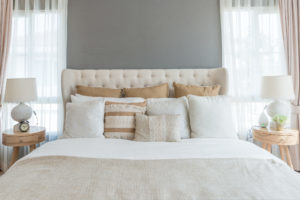Can Sleeping Temperature Affect Your Health?
Ever notice how conducive a chilly room is to good sleep? Turns out there’s a reason for that. Read on, and learn why it’s always preferable to set your sleeping temperature a little lower when you’re trying to get a good night’s rest.
How Temperature Affects Sleep
When we go to bed, our bodies’ temperatures start to fall. This natural process helps produce melatonin, a hormone that helps us fall asleep and enter into REM (rapid eye movement), a restorative stage of sleep that is essential to mental and physical health. When our bodies are too warm, this process can’t happen, and restlessness is often the case. When our body temperatures are too low we shiver and can’t sleep properly.
Fortunately, most of us have within our means the ability to lower our temperatures to where they need to be by means of our HVAC systems.
Ideal Temperatures for Sleeping
Sleep researchers have found the ideal range of temperatures for sleeping, though it depends on each individual, is usually within the 60-67 degree Fahrenheit range. Some persons may sleep better as high as 72 degree Fahrenheit, but several degrees lower than that is the norm.
In summertime, you probably want your daytime temperature in the 70s so you can save money on energy, and prevent your air conditioner from running continuously. In winter, you probably want to set the daytime temperature about 72-76 degrees F, as it is seldom terribly cold in our climate.
But at night, whether you are setting the heating or the air conditioning, you will want to set the temperature back maybe an hour before you go to bed. In fact, you may want to look into a Wi-fi or programmable thermostat so it can be set ahead of time and you never have to worry about forgetting to set it. The Wi-fi thermostat also allows you to adjust the temperature while you’re away.
To learn more about sleeping temperature and your HVAC system, contact NisAir Air Conditioning and Heating. We serve serve Martin, Palm Beach and Indian River counties.

